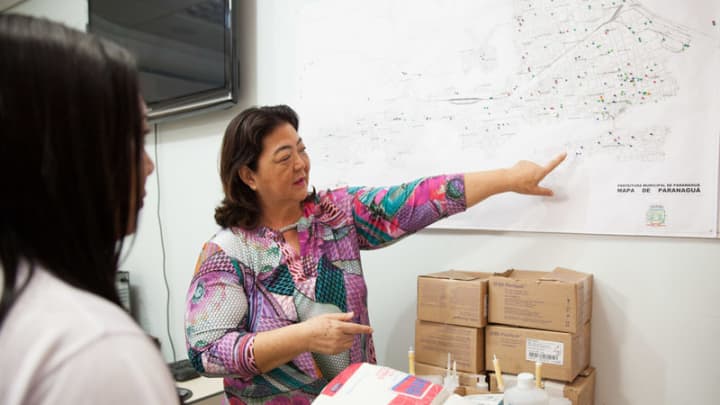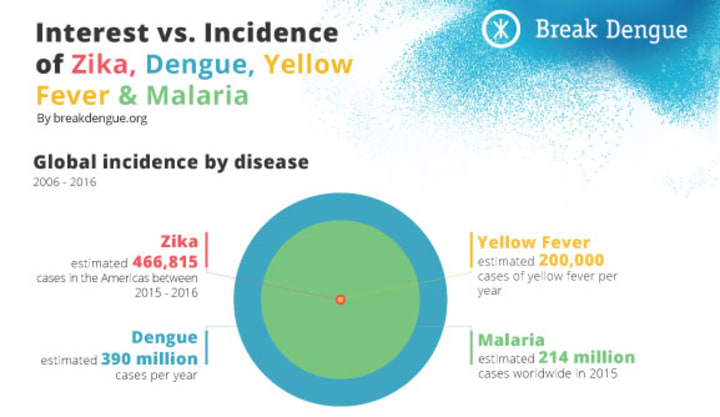
Every year, more than 1 million people die from vector-borne diseases. These diseases are carried by mosquitoes and other blood-sucking insects, who once infected can transmit the disease to hundreds of victims in an alarmingly short time frame.
Globalization of travel and trade, unplanned urbanization and environmental challenges such as climate change have had a significant impact on disease transmission in recent years. Some diseases, such as dengue, chikungunya and West Nile virus, are emerging in countries where they were previously unknown.
Dengue fever is of particular interest given its geographic spread, public health impact and capacity for disrupting health systems. It causes fever, headache, vomiting, joint pain and a skin rash, and has been linked to pregnancy risks. Spread by the same mosquito responsible for the Zika outbreak, it is the fastest-growing mosquito-borne viral infection in the world today.
In the 1970s, fewer than 10 countries reported epidemics of severe dengue. Today, dengue is present in over 150 countries, meaning that around 40 percent of the world’s population now live in countries where dengue is a daily risk.
An ongoing crisis
The economic toll of dengue fever and its impact on health systems are enormous — the total annual cost of dengue has been put at $8 billion.
Moreover, dengue outbreaks adversely affect other health service users. Health system capacity can adapt to meet predictable demand for malaria or diabetes care. But dengue outbreaks are sporadic, unpredictable and highly disruptive.
What can be done?
Despite progress in recent years, most cases of mosquito-borne infection are still not diagnosed today. Better diagnostics and wider disease surveillance data are required not only to get a handle on the true scale of the challenge, but also to measure the real-world impact of preventative measures such as mosquito control and immunization — and this is where technology comes in.
Break Dengue’s Dengue Track initiative is one example of a tool that tracks the epidemiology of dengue in order to understand and prevent future outbreaks. This crowdsourced tool offers a user-friendly online chat system which maps dengue cases worldwide, as well as giving the public free access to toolkits that help reduce their risk of infection.
As those who encounter dengue report the location through the chat system, a clear map can be plotted to show high-risk areas. By pairing this information with official data sources from governments and health care authorities, as well as data sourced from social media and search engines, an even more comprehensive picture of real-time dengue outbreaks can be built.
This will provide both authorities and nongovernmental organizations with valuable, actionable data based on which they can make informed decisions, as well as providing travellers with vital information if they are traveling to a high-risk area.

The same model could also be used to track and map countless other mosquito-borne diseases, such as Zika, malaria, yellow fever or chikungunya. It could also be extended to more digital channels to reach even more users, thus making it more equitable — although only a third of people in developing countries have access to the internet, over 95 percent have mobile phones, so developing an SMS-based service could be an important step in creating a health solution that serves all communities, not just the wealthy.
Tackling these viruses will require synergistic global solutions which harness the power of existing technologies, as well as creating new ones. When utilized in tandem, mosquito control, vaccination, rapid diagnostics and effective treatment for severe cases can combine to turn the tide against mosquito-borne diseases. Achieving this will require multinational, multisector efforts to raise public awareness of such diseases and implement effective solutions, and these will take time to put in place. But gathering as much information as we can about the spread of mosquito-borne diseases is a practical first step in turning the tide against them. Each one of these diseases poses a serious public health challenge about which much can be learned by studying and tracking other mosquito-borne illnesses.
To truly make the most of the technologies available to us, data experts need to step out of their traditional private sector roles and work collaboratively with NGOs and local governments. We need to create more partnerships to develop tools such as Dengue Track, which can locate existing cases and prevent mosquito-borne diseases from spreading further. Modern technology has already proven invaluable in the fight against hundreds of other diseases — let’s use it to combat these too.
Making Markets Work is an online conversation to explore what’s being done to make global health care markets accessible to people at the base of the pyramid. Over 10 weeks, Devex and its partners — The Abraaj Group, Philips and Population Services International — will amplify the discussion around effective health financing, analyze key challenges blocking universal market access in the health care supply chain, and explore the key strategies to make markets more effective. Join us as we look at this important issue, and share your thoughts by tagging #MakingMarketsWork and @Devex.


